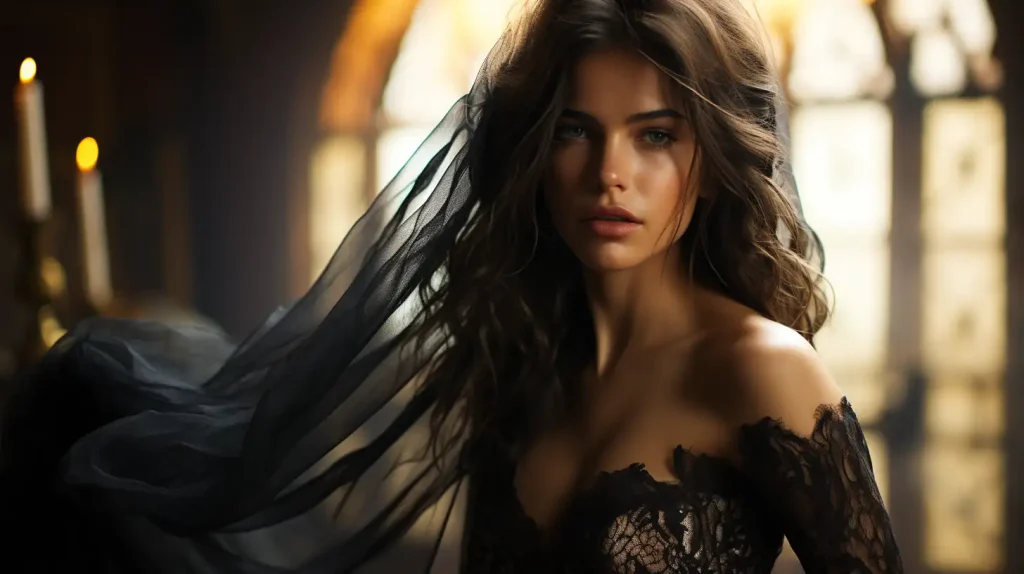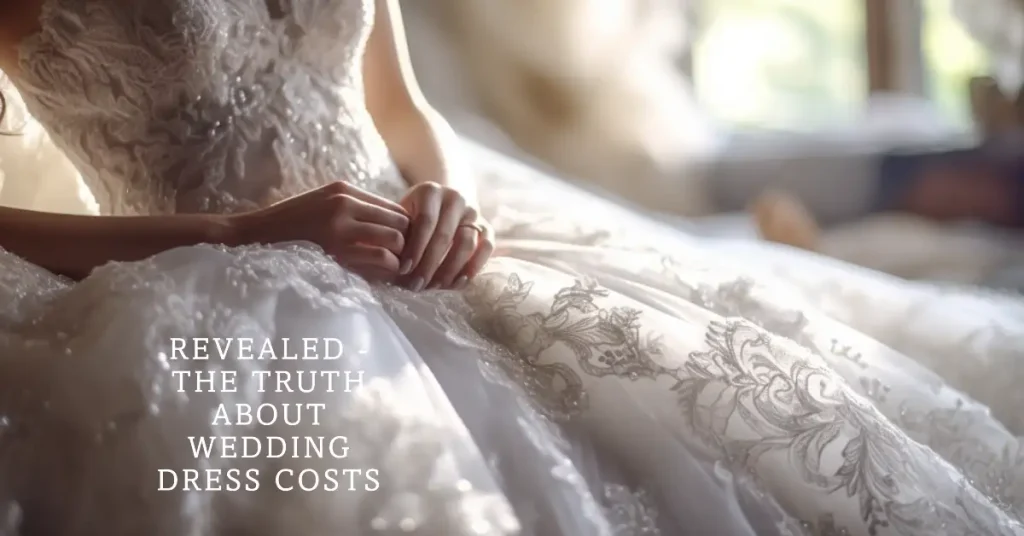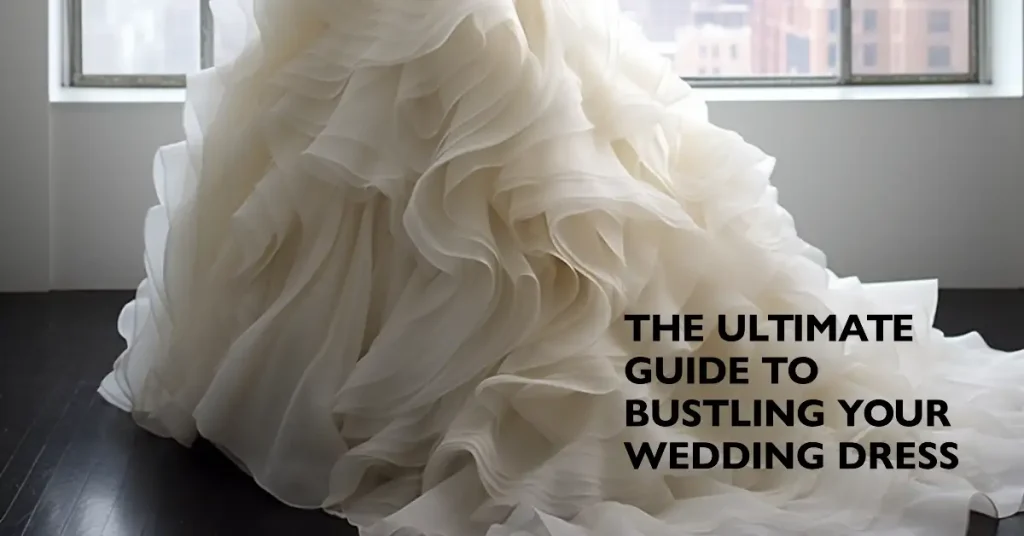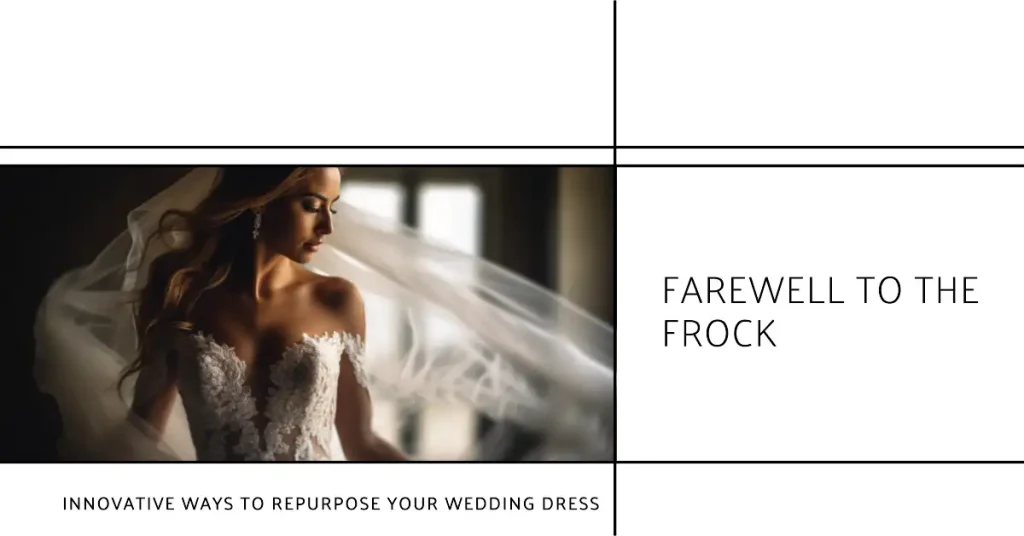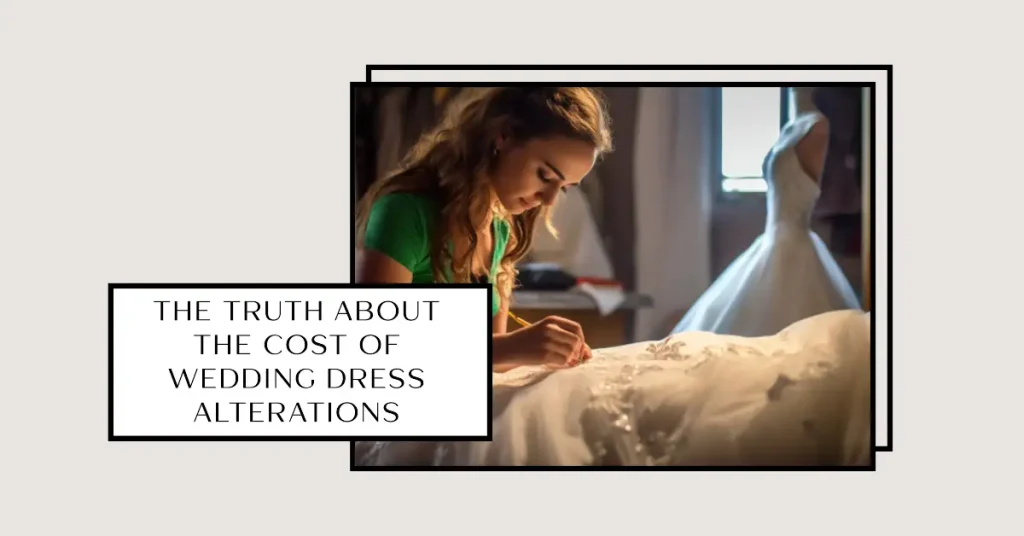Table of Contents
Wedding dresses are typically white, symbolizing purity and innocence, but in recent years, we’ve seen an increase in black wedding dresses. Black wedding dresses have been gaining popularity, but what do they mean? Why do some brides choose to wear them? This article will explore the history, symbolism, and cultural meanings behind this color choice.
Black wedding dresses may seem like a recent trend, but they actually have a long history. From ancient times to contemporary culture, black dresses have been worn for a variety of reasons. In this article, we’ll take a closer look at why black is becoming an increasingly popular choice for brides.
Key Takeaways:
- Black wedding dresses have a long history and are worn for various reasons.
- Symbolism behind the color black in wedding attire is related to traditional meanings and beliefs.
- Black dresses can challenge traditional gender norms and provide a platform for individuality and empowerment.
History of Black Wedding Dresses
Black wedding gowns may seem unconventional in modern Western culture, but their roots can be traced back to ancient civilizations. In ancient Rome, brides would wear dark-colored tunics or robes as a symbol of solemnity and reverence. The trend continued in medieval Europe, where black was the color of mourning and therefore worn at weddings as a symbol of loyalty and devotion to the groom.
- Carter, Lisa (Author)
- English (Publication Language)
- 107 Pages - 04/06/2024 (Publication Date) - Independently published (Publisher)
In the 18th and 19th centuries, white wedding dresses became popularized as a symbol of purity and innocence, thanks in part to Queen Victoria’s own white wedding gown in 1840. However, black wedding dresses still had their place in certain cultures and subcultures. In Japan, black was a traditional color for wedding kimonos, symbolizing the bride’s commitment to her husband. In Victorian England, black dresses were worn by brides who could not afford a new dress, as this was a practical color that could be easily re-worn for other occasions.
It wasn’t until the 20th century that black wedding gowns began to be seen as a deliberate statement or fashion choice rather than a practical necessity. In the 1920s and 1930s, flappers and avant-garde artists began experimenting with black as a statement of rebellion against traditional gender roles and societal norms. Black dresses also gained popularity with punk and goth subcultures in the 1980s and 1990s, as a way to express non-conformity and individuality.
History of Black Wedding Dresses
Despite the changing trends and cultural meanings, black wedding gowns have always carried a powerful symbolism of loyalty, commitment, and solemnity. Today, these dresses continue to challenge traditional norms and serve as a bold statement of personal style and empowerment.
Symbolism of Black in Wedding Attire
The color black has been associated with somber occasions and mourning in many cultures, making it an unconventional choice for a wedding dress. However, black dresses have become increasingly popular among brides who want to break away from traditional white gowns and showcase their unique style. But what does this color symbolize in wedding attire?
In general, black is often associated with elegance, sophistication, and formality. It is also said to represent the unknown and the mysterious, adding an aura of intrigue to any outfit. When it comes to weddings, black can symbolize different things depending on the cultural context and personal beliefs of the bride.
| Cultural Context | Meaning of Black Wedding Dress |
|---|---|
| Western Culture | Rebellion, independence, and unconventional style |
| Chinese Culture | Good luck, prosperity, and blessings |
| Victorian Era | Sophistication, high fashion, and social standing |
As you can see, the meaning of black in wedding attire can vary greatly depending on the cultural context and historical period. However, it is safe to say that wearing a black wedding gown can evoke a sense of mystery, elegance, and rebellion for the modern bride.
It is worth noting that black is also a popular color for bridesmaids’ dresses and accessories, especially when paired with metallic or jewel-tone accents. This allows the bride to incorporate black into her wedding theme without fully committing to a black gown.
Cultural Meanings of Black Wedding Dresses
Across many cultures, black is associated with death and mourning. In Western societies, it’s customary for attendees of a funeral or memorial service to wear black, symbolizing their sadness and grief. However, in some cultures, black can also represent good luck, prosperity, and joy.
For example, in Chinese culture, black is associated with water and is believed to bring good fortune and prosperity. Black dresses are a common sight at Chinese weddings, as they are thought to ward off evil spirits and bring good luck to the newlyweds. Similarly, in Indian culture, black is associated with the goddess Kali, who represents power and protection. Brides who wear black on their wedding day are thought to embody Kali’s strength and protection.
On the other hand, some cultures view black dresses as a symbol of rebellion and non-conformity. In Japan, Gothic Lolita subculture has become increasingly popular, with many young women wearing black wedding gowns as a way to reject traditional bridal attire and express their individuality.
Regardless of the cultural interpretation, wearing a black dress can be a bold and empowering choice. It can be a way to challenge traditional norms and celebrate one’s unique style and personality.
Contemporary Interpretations of Black Wedding Dresses
While black wedding dresses may have been considered taboo in the past, today they are embraced by brides who want to make a statement or showcase their individuality.
For instance, some couples opt for a gothic-themed wedding, with a black dress as the centerpiece. Others may choose a black dress as a tribute to a loved one who has passed away or as a nod to their cultural traditions.
The trend is also gaining popularity among brides who prefer a minimalist, timeless aesthetic over the traditional white lace and tulle. A black bridal gown can be a sleek and sophisticated option, exuding confidence and elegance.
Breaking Gender Norms with Black Wedding Attire
Black dresses can also be a way for brides to challenge traditional gender norms. By eschewing the typical white gown, brides can assert their individuality and showcase their personal style.
Moreover, black is often associated with strength and power, making it a fitting choice for brides who want their wedding day to be a celebration of their strength and resilience.
Breaking Gender Norms with Black Wedding Attire
One of the most significant factors that attract brides to black dresses is their ability to challenge traditional gender norms. For generations, white wedding dresses have been associated with femininity, purity, and innocence. When brides opt for a black wedding gown, they step outside the stereotypical gender roles, offering an individual expression of self.
Black wedding dresses are symbolic of authority, power, and strength and can be empowering for women. These dresses are a way to re-write the social norms and offer a platform for brides to make a bold statement on their big day.
Brides can accessorize black dresses with statement jewelry, veils, and shoes, adding a splash of color and personality. For brides who want to add an extra touch of femininity, they can opt for a dress with lace or sheer details or add a pop of color in the bouquet.
Celebrities and Black Wedding Gowns
Over the years, several high-profile celebrities have opted for black wedding dresses, making the trend more popular and mainstream. Celebrities such as Dita Von Teese, Sarah Jessica Parker, and Shenae Grimes-Beech have all walked down the aisle in black gowns, adding a unique twist to their wedding day attire.
Dita Von Teese, a burlesque performer and model, chose a black gown for her wedding to Marilyn Manson in 2005. The dress was a custom-made design by Galliano, featuring a full skirt and a deep V-neckline. Von Teese later revealed that she opted for black as she wanted to keep it “private and gothic.”
Sarah Jessica Parker, known for her role in Sex and the City, surprised everyone when she wore a black gown for her wedding to Matthew Broderick in 1997. The actress’s gown was a simple Morgane Le Fay design with a sheer black overlay, paired with a black veil and a bouquet of white and green flowers. The dress was widely criticized at the time, but it has since become an iconic moment in fashion history.
Shenae Grimes-Beech, a Canadian actress best known for her role in Beverly Hills, 90210, also went for a black gown on her wedding day in 2013. The dress was a Vera Wang design, featuring a lace bodice and a full tulle skirt. Grimes-Beech later explained that she chose black because she wanted to “be different and rock something unique.”
The Influence of Celebrities
The choice of black wedding gowns by celebrities has undoubtedly contributed to the growing interest in the trend. Their high-profile weddings and red carpet appearances have made black gowns more visible and accepted, inspiring more brides to consider unconventional wedding attire.
Moreover, celebrities have helped to break down the stereotypes and stigma surrounding black wedding dresses. By wearing them on their big day, they have shown that black can be a sophisticated and elegant choice, and that it is possible to make a bold statement while still looking chic and stylish.
However, it is important to remember that not all brides can afford custom-made designer gowns like those worn by celebrities. Nonetheless, there are many affordable options available in the market, and brides can always find a dress that fits their style, personality, and budget.
Embracing Black Wedding Dresses Today
For brides who are considering a black dress, there are many styling options to choose from. A popular trend is to pair a black gown with a bold lip color or statement accessory, such as a sparkling headpiece or colorful bouquet. For a more traditional look, black can be incorporated into the dress design through intricate lacework or subtle beading.
| Tip: | Consider the venue and time of day when choosing a black wedding dress. For a nighttime event or formal affair, a full-length black gown can create a stunning, elegant look. For a daytime or outdoor wedding, a shorter style or a white dress with black accents may be more appropriate. |
|---|
It’s important for brides to feel confident in their choice of a black wedding dress, as it can be a powerful statement of individuality and personal style. Confidence can be built by selecting a dress that flatters the figure and complements the skin tone, as well as practicing walking and posing in the dress beforehand.
“A bride should never feel limited by tradition or expectations when it comes to her wedding attire. Choosing a black wedding dress can be a bold and empowering decision that symbolizes strength, independence, and rebellion against societal norms.”
Ultimately, the decision to wear a black wedding gown should be based on personal preferences and style. Brides should not feel pressured to conform to traditional expectations and should embrace the opportunity to express themselves in a unique and memorable way on their special day.
Black Wedding Dresses in Different Cultures
Black wedding gowns have been a part of various cultures throughout history, each with unique symbolism and significance. In some societies, black is associated with mourning and sadness, while in others it symbolizes power, sophistication, and elegance.
In Japan, black wedding kimonos called uchikake are worn by brides during the ceremony for their modesty and simplicity. Traditional Chinese weddings also feature black dresses, which represent loyalty and devotion. In Morocco and other North African countries, black wedding dresses symbolize the couple’s deep love and commitment to each other.
| Culture | Symbolism |
|---|---|
| Japan | Modesty and simplicity |
| China | Loyalty and devotion |
| Morocco and North Africa | Deep love and commitment |
Other cultures, such as those in Africa and India, incorporate black dresses as a sign of wealth and prosperity. In some African societies, black wedding dresses are reserved for royalty and nobility, while in India, black silk saris are worn by brides during pre-wedding rituals.
Some cultures also use black wedding dresses as a way to honor their ancestors and heritage. In parts of Nigeria and Ghana, black wedding dresses represent the connection between the living and the dead, while in Ireland, black wedding dresses are worn to honor the country’s rich and complex history.
Overall, the cultural meanings and interpretations of black wedding dresses are diverse and encompass a wide range of emotions and beliefs. Whether it symbolizes power, elegance, or love, the choice to wear black on your special day is a personal one that reflects your individuality and style.
Modern Alternatives to Black Wedding Dresses
While black wedding dresses are gaining in popularity, some brides may still feel hesitant about embracing such a bold choice. Fortunately, there are other options for those who want to break away from traditional white gowns:
- Other Dark Hues: If black feels too intense, other dark hues like navy, charcoal, and burgundy can provide a similar effect while still offering a bit of classic bridal style.
- Printed and Textured: Brides who want to add some dimension to their wedding dress without going fully black can opt for a printed or textured gown. Floral prints and lace overlays are popular choices.
- Two-Piece Sets: Two-piece sets are a modern and trendy alternative to traditional gowns. A black (or other dark-hued) top paired with a flowing white or ivory skirt can create a striking, yet still bridal, ensemble.
- Non-Traditional Colors: For those who want to stand out but not necessarily with black, consider a non-traditional color like blush, champagne, or pale blue.
Whatever alternative a bride chooses, the most important aspect is that it reflects her personal style and vision for her big day.
Conclusion
After exploring the history, symbolism, and cultural meanings of black wedding dresses, it is clear that this unconventional choice of wedding attire has a multitude of interpretations and significance.
While traditionally associated with mourning and negativity, the color black can also represent elegance, sophistication, and empowerment in the context of a wedding. Black wedding dresses offer a platform for individual expression and can challenge traditional gender norms in the wedding industry.
Moreover, black wedding dresses have been incorporated into various cultures and societies, each with their own unique symbolism and significance. From Gothic aesthetics to modern minimalism, black wedding dresses have inspired numerous contemporary interpretations and have been embraced by notable celebrities in recent years.
For brides considering a black wedding dress, there are various styling options and accessories available to make the look uniquely their own. However, for those who may not want to fully commit to a black wedding dress, there are alternative options available that still offer an unconventional twist on traditional wedding attire.
Overall, black wedding dresses serve as a reminder that traditional customs and expectations can be challenged and reinterpreted to fit personal preferences and values. With its rich history and cultural significance, the black wedding dress is a symbol of individuality, empowerment, and modernity in the wedding industry.
FAQ
Q: What does a black wedding dress mean?
A: The meaning of a black wedding dress can vary depending on cultural and personal interpretations. It is often associated with notions of mystery, sophistication, and rebellion.
Q: What is the history of black wedding dresses?
A: Black wedding dresses have a long history, with origins traced back to ancient cultures and time periods. They were traditionally worn by nobility and have evolved over time.
Q: What is the symbolism of black in wedding attire?
A: Black in wedding attire symbolizes different meanings such as elegance, formality, and a departure from traditional white wedding dresses. It can also represent personal style and individuality.
Q: What are the cultural meanings of black wedding dresses?
A: Cultural meanings of black wedding dresses vary across different societies. They can be influenced by religious customs, traditional beliefs, and cultural interpretations of color symbolism.
Q: Why do some brides choose to wear black wedding dresses?
A: Brides may choose to wear black wedding dresses as a form of self-expression, to stand out, or to challenge traditional norms. It can also be a reflection of personal style and taste.
Q: How do black wedding dresses challenge gender norms?
A: Black wedding dresses challenge gender norms by defying the traditional association of white dresses with femininity. They provide an opportunity for brides to express their individuality and empower themselves.
Q: Which celebrities have worn black wedding dresses?
A: Several notable celebrities have opted for black wedding dresses, contributing to the popularity of this trend. Their choices have influenced and inspired others to consider unconventional bridal attire.
Q: What should brides know when considering a black wedding dress?
A: Brides considering a black wedding dress should consider styling options, accessories, and how to feel confident in their choice. It’s important to embrace personal style and ensure it reflects their vision for their special day.
Q: How are black wedding dresses incorporated into different cultures?
A: Black wedding dresses have various roles and symbolism in different cultures. They may be part of traditional ceremonies or represent cultural customs and beliefs surrounding marriage.
Q: What are alternative options for unconventional wedding attire?
A: For brides who want unconventional attire but may not want to wear a black wedding dress, alternative options include colored dresses, unique fabrics, or incorporating black accents into the outfit.

